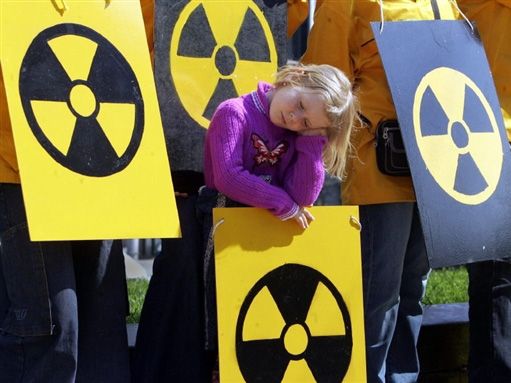Hrushavy has been particularly industrious in the creation of civil movement initiatives involving people from different parts of Belarusian society. However, in the ten years since he received the prize the human rights situation in Belarus has only deteriorated, which is why the Rafto foundation has singled out Henadz Hrushavy and Belarus as one of its focus areas.
The Chernobyl legacy
Hrushavy’s civic awareness was raised by the Chernobyl disaster and the consequences it had for the lives of people in Belarus.
Even though the disaster happened in 1986, it did not become a part of public debate in the then Byelorussian Soviet Republic until 1989, when Hrushavy initiated a march to commemorate the victims of the disaster and heighten awareness about it among his fellow citizens.
 The same year he initiated and became the leader of the foundation “Children of Chernobyl”. Since it was set up in 1989 the foundation has helped more than 300,000 Belarusian children travel abroad to rest in a healthier environment and receive medical treatment.
The same year he initiated and became the leader of the foundation “Children of Chernobyl”. Since it was set up in 1989 the foundation has helped more than 300,000 Belarusian children travel abroad to rest in a healthier environment and receive medical treatment.
Women-trafficking
Towards the end of the 1990s Hrushavy saw the need to diversify his efforts to include broader social issues. The new efforts are oriented towards women, young people and different professional groups.
One example is the establishment of a Forum for Women, which helps women who have fallen victim to domestic violence or trafficking.
Another example is the establishment throughout the country of youth centres, where young Belarusians meet to address crucial social issues.
Look into the Future
For nine years in a row 1999 Rafto prize laureate Henadz Hrushavy and his organisation Children of Chernobyl have arranged annual festivals and conferences in Minsk under the heading “Look into the future”. They have gathered representatives from youth centres throughout Belarus.
In October 2009 young delegates from Belarus aged nine to thirty met to discuss ecological issues. The different delegations had prepared sketches, musical acts, dances and other highly artistic presentations devoted to environmental issues. Several of them focused on sustainable technology and were well attuned to the questions raised at the 2009 United Nations Climate Change Conference held in Copenhagen.
to discuss ecological issues. The different delegations had prepared sketches, musical acts, dances and other highly artistic presentations devoted to environmental issues. Several of them focused on sustainable technology and were well attuned to the questions raised at the 2009 United Nations Climate Change Conference held in Copenhagen.
Others brought attention to more concrete issues, singling out the personal responsibility of each individual to treat our surroundings with care. Some very brave participants raised the politically highly controversial issue of expanded use of nuclear energy in Belarus.
Rafto participation
The Rafto foundation’s involvement in Belarus started with a concert in Minsk in the autumn of 2007, to honour 100 years since the death of the world renowned Norwegian composer Edvard Grieg. In 2008 the foundation got involved in the organisation of the youth festival “Look into the future”. In addition to the representatives from the Rafto foundation, three young Norwegians participated at the conference, and two Norwegian musicians gave concerts in Minsk.
In 2009 the Norwegian delegation to the festival numbered ten persons. In addition to three participants from the Rafto foundation, the delegation included representatives from the Norwegian youth organisations “Natur og Ungdom” and “Press — Save the Children Youth”, a group of three musicians headed by Ole Hamre, and a photographer. The youth representatives shared their experiences from working in Norwegian youth organisations, while Ole Hamre’s innovative instrument Folkofonen amazed the Belarusian audience with its combination of high technology and a highly original idea.
Tight control
Hrushavy’s activities have always been under the scrutiny of Belarusian authorities. On several occasions he and his organisation have been threatened with lawsuits or the withdrawal of necessary official recognition.
However, Hrushavy is more concerned about the situation for the many volunteers throughout the country, who work under a constant pressure from local authorities.
 “The situation is difficult for people at the local level,” says Hrushavy. “The children are accompanied here by teachers and local volunteers, who are held responsible for the children’s well-being. They need the authorisation from the headmaster of the school and officials at the municipality administration to participate at our events. If any of these dislike the activities of our organisation, they simply refuse to put their name on the paper. We experience this on an annual basis. Luckily, I have a well-established network of connections all over Belarus, and in many instances I manage to settle such issues.”
“The situation is difficult for people at the local level,” says Hrushavy. “The children are accompanied here by teachers and local volunteers, who are held responsible for the children’s well-being. They need the authorisation from the headmaster of the school and officials at the municipality administration to participate at our events. If any of these dislike the activities of our organisation, they simply refuse to put their name on the paper. We experience this on an annual basis. Luckily, I have a well-established network of connections all over Belarus, and in many instances I manage to settle such issues.”
Hrushavy is determined to continue his work with Belarusian youth. According to him, the main value lies in the high level of involvement among young people, who form the core of the organising committee. It is important that they not only participate in the events, but also play an active role as organisers. In this way they learn how to create a better future for themselves. He already looks forward to next year’s conference, stating that “The continuation of this work in the future will be of great value.”
Sources: Novy Chas 16.10.09


